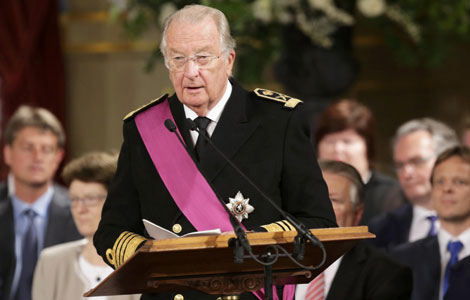Yuan influence on the rise worldwide
Updated: 2013-07-22 02:00
By WANG XIAOTIAN and LI XIANG (China Daily)
|
||||||||
More nations turn to Chinese currency for investment and trade settlement
Although the money markets have gone into a tizzy recently, there have been some unrelated developments that clearly underscore the growing global influence of China's currency, the yuan also known as renminbi.
Indications that the yuan is well on its way to becoming an "international" currency heightened after important currency trading centers such as Paris, Luxembourg, Frankfurt, Sydney and Dubai expressed interest in becoming offshore yuan-trading centers. Major money markets, including Hong Kong, Taipei, Singapore and London, are already part of the lucrative offshore yuan-trading club.
"There is no doubt that the renminbi is gaining international recognition and that there is demand for it outside the Chinese mainland," says Ravi Menon, managing director of the Monetary Authority of Singapore.
"The expansion of offshore renminbi-funding centers as well as the setting up of swap lines between the People's Bank of China and various central banks, including the latest agreement with the UK, bear evidence to this."
He says a stable and thriving Chinese economy is the best foundation on which to further the use of the yuan globally.
Zhang Lei, general manager of the global payment and clearing division at Bank of China, says: "The internationalization of the yuan has entered a critical period as yuan usage is strengthening in regions outside the Asia-Pacific."
Although there are several contenders, the European cities have the best credentials for bagging yuan deals, he says.
Growing interest
The Frankfurt-based European Central Bank is likely to enter into a swap agreement with the People's Bank of China for as much as 800 billion yuan ($130 billion), Bloomberg reported earlier this month, citing prominent lobby group Frankfurt Main Finance.
The deal, four times the 200-billion-yuan agreement signed in June between the Bank of England and PBOC, is expected to give central banks from the eurozone access to yuan funds.
"One of the major themes of the current negotiation is whether it should be mandatory for all members of the eurozone or it is only on a volunteer basis," says Philippe Mongars, deputy director of the market operation department at the Bank of France.
French President Francois Hollande said earlier that the Bank of France and the PBOC will soon reach a deal over a currency swap agreement within the framework of the ECB.
Nearly 10 percent of the commercial transactions between China and France are currently settled in yuan. Banking deposits in yuan in Paris have amounted to about 10 billion, the second largest pool of such deposits in Europe, according to Paris Europlace, a professional association that supports the French financial industry and promotes Paris as an international financial center.
Zhang, however, feels the eagerness and readiness of Luxemburg is more obvious because it appointed BOC as the first yuan-clearing bank in the country as early as July.
Luxemburg, the world's eighth largest financial investment center and Europe's biggest fund management center, had secured yuan deposits of 20 billion yuan by January, the highest in the eurozone. Yuan loans extended in Luxemburg reached 30 billion, while local fund industries manage yuan assets of 200 billion.
The largest offshore yuan center, Hong Kong, which accounts for 70 percent of overseas yuan deposits, held deposits of 698.5 billion yuan by May, according to data released by Hong Kong Monetary Authority.
"In financial terms, Luxembourg is even more important than Paris or London," says Nicolas Mackel, chief executive of Luxembourg for Finance, an agency that promotes Luxembourg as an international financial center. "We consider ourselves as a European hub especially in financial services. We don't do trading financing in that sense. But there are other services relating to renminbi that we could focus on."
More than half of Chinese investment in Europe gets structured through Luxembourg. The increasing presence of Chinese banks will also give his country an edge, Mackel says.
Luxembourg is already the European headquarters of BOC and Industrial and Commercial Bank of China.
China's Construction Bank, the second-largest Chinese lender, will soon open its European headquarters there.
Joachim Nagel, member of the executive board of the Deutsche Bundesbank, says the strong trading position between Germany and China has generated enough momentum for setting up an offshore yuan-trading center in Frankfurt.
"I believe the renminbi will develop into a global reserve currency. There is intense competition in the financial world for being a part of the renminbi trading system," says Nagel.
He says the biggest challenge for contenders such as Germany would be to initially maintain a certain amount of liquidity in Frankfurt. Major multinational companies and banks could be the "ice breaker" by bringing in the desired volumes through yuan trading.
"The renminbi is a big currency and will play a bigger role in the future in the international market. I think the market is big enough to have multiple yuan-trading centers in Europe," Nagel says.
Mongars, of the Bank of France, feels that there would not be too much competition among the major European financial centers, because the currency swap deal will serve as a back-up facility when there is a serious liquidity shortage of the yuan in the eurozone, and also negates the need for an alternative funding source.
Wim Raymaekers, head of the banking market at the Society for Worldwide Interbank Financial Telecommunication, says financial institutions in the UK, France and Germany are increasingly adopting the yuan to support trade settlement by their corporate customers.
Outside Europe, Dubai is likely to become another major offshore yuan-trading center after Taipei as it refocuses on its roles as a regional hub for trading, logistics and tourism, says a recent report published by Standard Chartered Bank.
Most Viewed
Editor's Picks

|

|

|

|

|

|
Today's Top News
Guangdong to probe airport bomber's allegations
Police meets GSK representative after scandal
US protests demand 'justice for Trayvon'
Minister rules out stimulus package
Top Chinese admiral to visit US this year
Victory improves Abe's hand
6.6-magnitude quake hits NW China
Yuan influence on the rise worldwide
US Weekly

|

|














